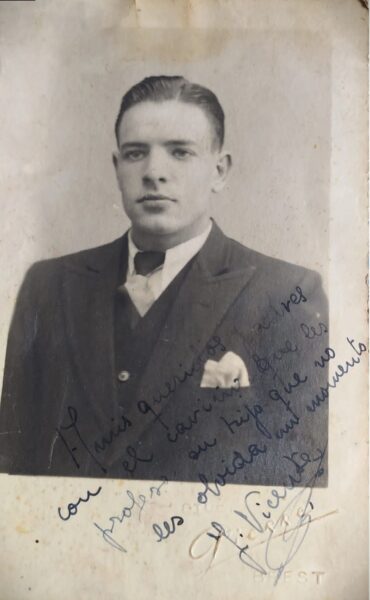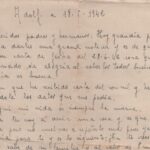José Vicente Anadón
- Date of Death: August 1945
- Place of Birth: Mataró, Barcelona, Spain
- Place of Death: Plaine Saint-Denis, Seine-Saint-Denis, France
- Date of Deportation: February 1942
- Address when Deported: Brest U-boat base
- Place of deportation: Alderney
- Sites deported to: Norderney,
By Nuri Bonamusa i Vilà, AIC, Amical Islas del Canal (Amical of the Channel Islands)
José Vicente Anadón was born in Mataró (Barcelona) on November 12, 1921. His family emigrated at the beginning of the 20th century to this Catalan city, being originally from Fuenferrada, a small town in the mining area of Portalrubio in Teruel. José, the youngest of the family, followed his older brothers in their political ideas, frequenting with them “La Casa del Pueblo” de Mataró and joining the UGT and the Socialist Youth of Catalonia at a very young age. He was called up in July 1938 but from here his experience in the civil war is unknown.
The first news about his exile in France comes in April 1939 in the town of Morcenx (Landes), working as a baker. In 1940 he also worked in Caixon (Hautes-Pyrénées), in the same occupation. In January 1941 he joined the 528th GTE in the locality of Neuvic d’Ussel and Valiergues (Correze), where, thanks to speaking and writing French, he was able to work in an office, instead of cutting down trees like the other workers.
In August 1941 he was taken to Brest, in occupied Brittany, as a forced laborer, already in the hands of the German Todt Organization for the construction of the U-boat base, which was part of the colossal Atlantic Wall conceived by Hitler. In February 1942, due to repressive measures, he was deported to the island of Alderney together with some three hundred Spanish Republicans. He was in Norderney OT camp, working in a quarry located 4 kilometers away, and making the journey by foot. He continued to work on the construction of bunkers for the Atlantic Wall 12 hours a day, 7 days a week.
He was transferred to Guernsey in August 1942, coinciding with the massive arrival of Russian prisoners in Norderney camp. In April 1943 he was transferred again to Saint Servan (Ille et Vilaine), from where he escaped. After passing through some Normandy villages such as Granville and Conches-en-Ouche, where he worked as a mechanic and cook, he moved to the Plaine Saint Denis, near Paris, around the time of D-Day, the landing of the Allies. There he settled on the outskirts of Paris, with a companion from Madrid, who was also deported to Alderney on 1942 with José, until his death in early August 1945, from pneumonia, at the age of 23.
In the 2010s, one of his nephews found his letters from exile in a box he inherited from his mother, José’s sister. Until that time the family was unaware of the existence of their relative.
SOURCES
Cartes des de l’exili. Josep Vicente i Anadon, atrapat entre dues guerres (Letters from Exile. Josep Vicente i Anadón, trapped between two wars). Margarida Colomer i Rovira, Nuri Bonamusa i Vilà, David Farell i Garrigós. 2023
Map
- Cemetery / Mass Grave
- Concentration Camp
- Forced Labour Camp
- Prison
- Worksite / Fortification

